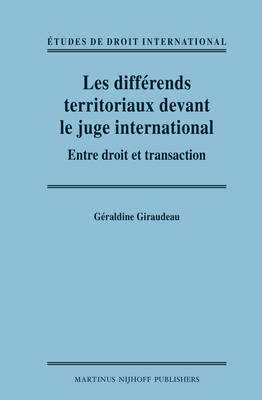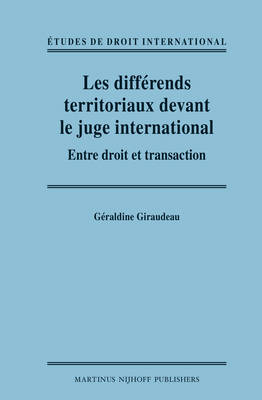
- Afhalen na 1 uur in een winkel met voorraad
- Gratis thuislevering in België vanaf € 30
- Ruim aanbod met 7 miljoen producten
- Afhalen na 1 uur in een winkel met voorraad
- Gratis thuislevering in België vanaf € 30
- Ruim aanbod met 7 miljoen producten
Zoeken
Les Différends Territoriaux Devant Le Juge International
Entre Droit Et Transaction
Géraldine Giraudeau
€ 412,45
+ 824 punten
Omschrijving
Arbitral and judicial decisions dealing with territorial land and maritime disputes bear the mark of compromising. They draw boundaries situated between the respective pretentions of the parties and ensure an equitable share of spaces and resources. This phenomenon of compromising symptomatically appears in the jurisprudence dealing with territorial disputes, because of their specific nature, and the geostrategic, economic and emotional factors at stake. It is also due to the remarkable flexibility of applicable norms and principles, which provides a vast power of appreciation to the judge. This study enhances how the content of the decisions is used in order to reach a balanced solution and demonstrates that the international judge focuses on peacekeeping considerations.
Les décisions arbitrales et judiciaires relatives aux différends territoriaux terrestres et maritimes sont marquées par une tendance transactionnelle. Elles consacrent des tracés frontaliers situés entre les revendications respectives des parties et assurent plus globalement un équitable partage des espaces et des ressources. Ce phénomène de compromis s'exprime symptomatiquement dans la jurisprudence relative aux différends territoriaux en raison de la nature de ces litiges et de leurs enjeux géostratégique, économique et émotionnel. Il est aussi dû à la particulière flexibilité des règles et des principes applicables. Cette étude témoigne de l'instrumentalisation qui est faite du contenu des décisions juridictionnelles au profit de solutions équilibrées et démontre que le juge international est avant tout tourné vers la mission pacificatrice de son office.
Les décisions arbitrales et judiciaires relatives aux différends territoriaux terrestres et maritimes sont marquées par une tendance transactionnelle. Elles consacrent des tracés frontaliers situés entre les revendications respectives des parties et assurent plus globalement un équitable partage des espaces et des ressources. Ce phénomène de compromis s'exprime symptomatiquement dans la jurisprudence relative aux différends territoriaux en raison de la nature de ces litiges et de leurs enjeux géostratégique, économique et émotionnel. Il est aussi dû à la particulière flexibilité des règles et des principes applicables. Cette étude témoigne de l'instrumentalisation qui est faite du contenu des décisions juridictionnelles au profit de solutions équilibrées et démontre que le juge international est avant tout tourné vers la mission pacificatrice de son office.
Specificaties
Betrokkenen
- Auteur(s):
- Uitgeverij:
Inhoud
- Aantal bladzijden:
- 558
- Taal:
- Frans
- Reeks:
- Reeksnummer:
- nr. 6
Eigenschappen
- Productcode (EAN):
- 9789004228313
- Verschijningsdatum:
- 3/12/2012
- Uitvoering:
- Hardcover
- Formaat:
- Genaaid
- Afmetingen:
- 163 mm x 236 mm
- Gewicht:
- 952 g

Alleen bij Standaard Boekhandel
+ 824 punten op je klantenkaart van Standaard Boekhandel
Beoordelingen
We publiceren alleen reviews die voldoen aan de voorwaarden voor reviews. Bekijk onze voorwaarden voor reviews.








